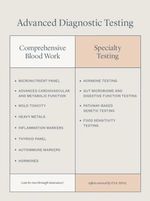Health is never one-size-fits-all, but despite that, patients are often given band-aid solutions that neglect to address the root cause of their specific, individual ailments. As a functional medicine provider, getting a clearer perspective of what’s going on in a patient’s body from a biochemical perspective allows me to create a treatment plan tailor-made for the individual.
Advanced medical testing offers just that: a magnifying glass to look at a patient’s health and better understand just what’s going on (or going wrong) inside.
What is Advanced Diagnostic Testing?
Advanced, personalized diagnostic testing — which looks at everything from genetic predispositions to the types of bacteria living in our gut — helps get to the root cause of any potential imbalances in the body and allows clinicians to specifically tailor treatment plans to individual patient needs.
The testing process is nuanced. Because we're treating the individual (and not just the lab results), we take symptoms, goals, genetic predispositions, past labs and medical history into account. From there, we use appropriate tests to lead us to treatment for that specific individual.
Testing falls into two main categories:

What Can Comprehensive Blood Work Tell You?
In functional medicine we often say, “You’re only as strong as your weakest link” because the biochemical processes in the body are so delicately and intricately connected. In order to treat the root cause of any imbalance or disease, we first need a thorough understanding of what’s happening in the body — and where the weakest link may be.
Our testing methods allow us to pick up on disease processes years earlier than those of conventional tests, allowing us to tailor a roadmap aimed at optimizing longevity for each patient.
Below, a list of tests available at THE WELL:
Micronutrient Panel — Many micronutrient deficiencies can tip us off to the possibility of a malabsorption issue in the gut. It’s important to make sure all these nutrients aren’t just in the standard reference range (the range of the lab’s testing population only), but in an optimal range.
Advanced Cardiovascular — Often when someone goes to the doctor, they’re only having basic lipid panels done (LDL, HDL, triglycerides), but this doesn’t actually give us much insight into the patient’s risk factors. An advanced cardiovascular panel looks at the size and pattern of those particles as well as other important markers of inflammation. In order to properly assess a patient’s risk, we need to be looking at the full picture — like, for example, how certain density LDL particles are much higher risk than others. There’s a lot we can do to remedy suboptimal levels with shifts in diet, lifestyle and highly targeted supplements.
Metabolic Function — With metabolic function, we don’t just look at fasting glucose and HbA1C, we also take into account other comprehensive markers such as fasting insulin, fructosamine and C-reactive protein, among others. This type of thorough approach can help us identify early clues of insulin resistance while there’s still plenty we can do to turn things around.
Mold and Heavy Metal Toxicity — Depending on certain red flags in the patient’s history, initial screenings in blood work can give us a sense of whether a patient is dealing with a toxic burden (commonly mycotoxins or heavy metals). Then, if we suspect any level of toxicity that may be affecting the patient, we can do more specialized testing. This is especially helpful for patients dealing with chronic issues; having a high toxic burden can make it difficult to heal because the body’s detoxification system is already weighed down with toxicities.
Inflammation Markers — Acute inflammation is a normal process in the body. What we’re concerned with is chronic, long-term inflammation. Chronic inflammation is at the root of all disease, so it’s important to test for different markers of inflammation, which can tip us off to certain patterns and processes in the body.
Thyroid Panel — We do a full thyroid panel where we not only look at TSH (thyroid-stimulating hormone), but also thyroid hormones that can clue us into whether the thyroid is functioning optimally and if there are antibodies or signs of autoimmune disease present. This allows us to pick up on thyroid imbalances even before they become clinically significant. For example, someone might have normal levels of TSH but antibodies that tip us off to an autoimmune process already starting in the body.
Hormones — Again, for both males and females, we look for optimal ranges here, not just the lab's standard reference range. When testing hormones, it’s important to time blood work appropriately, especially if you’re looking for certain imbalances like estrogen dominance or low progesterone. For example, in females, optimal ranges of hormones taken on day three of the cycle versus day 21 differ considerably.

What Can Specialty Testing Tell You?
Functional medicine providers at THE WELL look at blood work in combination with specialty testing and genetic testing so that we not only see what a person’s genetic propensity is, but also what's actually happening in the body. Pairing these tools is incredibly insightful.
Here’s how THE WELL uses specialty testing:
1 Hormone Testing (DUTCH test)
Hormones work as your body’s chemical messengers and influence many functions, such as metabolism, reproduction, sleep and mood regulation. When they’re off, they can drastically impact your health.
In addition to knowing the amount of hormones a patient is producing, it’s important to know how those hormones are being used, processed and eliminated. This is where hormone metabolite testing can come in. This type of test helps us determine optimal hormone levels for a patient, and if these hormones are safely and effectively being metabolized and eliminated from the body. The DUTCH test measures sex and adrenal hormones and melatonin, along with their metabolites, to identify potential hormonal imbalances.
2 Microbiome Testing (Gut Zoomer or GI Map)
In a healthy microbiome, the trillions of microorganisms living in our gut (close to five pounds of bacteria!) live in balanced harmony. If the gut microbiome is disrupted, it can lead to dysbiosis (an imbalance of the 'good' and 'bad' bacteria) or intestinal permeability (also referred to as leaky gut) and wreak havoc on our health.
Microbiome testing gives us a sense of what’s going on in the gut and allows us to look at levels of commensal (protective bacteria) so that we can ensure adequate levels and better tailor treatment to heal and balance the microbiome. It also shows us potential harmful pathogens such as parasites, bacteria and fungi so that we can use targeted approaches to address any overgrowth. Additionally, it allows us to look at enzymatic and digestive function, inflammation and markers indicative of increased intestinal permeability (also referred to as leaky gut).
RELATED: All About SIBO and SIFO
"Genes load the gun and environment pulls the trigger.”
1 Genetic Testing (3x4 Genetics)
It’s often thought that our genes dictate our health outcomes, but that’s not the full picture. Think of it like this: Genes load the gun and environment pulls the trigger.
Once we know a patient’s genetics, there are so many things we can do to support any genetic weaknesses or predispositions — meaning your genes are not your destiny.
As opposed to most of the genetic testing currently on the market that looks at SNPs (genetic variants) in a silo, pathway-based genetic testing (what we use) gives us data on how our genes are working together (e.g. ‘pathway-based’) and contributing to our body’s inflammation, detoxification, methylation and much, much more. This provides us with critical information to heal the body, prevent disease and optimize wellbeing.
2 Food Sensitivity (through Vibrant labs)
With food sensitivity testing, you have to take some of your results with a grain of salt. There are two common types of testing used to screen for food sensitivities: protein level testing (most common) and peptide/amino acid level testing.
The issue with protein level testing is that it tests against the whole intact protein, which can cause molecular mimicry and lead to more false positives. If someone gets protein level testing done and it comes back with 36 sensitivities, it can be extremely stressful and limiting to their life, and a lot of times the results are not accurate. The goal is not for patients to live in fear of certain foods.
We’re very purposeful when it comes to food sensitivity testing. Frequently, when someone is reacting to certain foods, the issue is not actually the food itself, but rather an imbalance in their gut, which we can address. It’s not uncommon for us to heal a patient’s gut and have major improvements (or even resolution) of their food sensitivities.
If we think a food sensitivity test is indicated for a patient, we do peptide/amino acid level testing, which is more specialized and less likely to be influenced by molecular mimicry, leading to false positive results. Peptide/amino acid level testing in combination with clinical symptoms can validate if someone really should avoid a certain food.
Looking to meet with a Functional Medicine practitioner? Book an appointment here. While the initial consultation must be in-person at THE WELL New York, follow-up meetings can be scheduled for in person or online.




